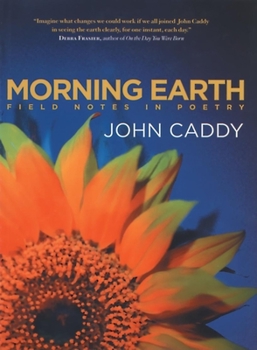Morning Earth: Field Notes in Poetry
In Earth Journal, John Caddy advocates poetry as a physical act--a morning practice or devotion, a decision to record quickly and without forethought the direct, momentary experience of each new day. Presenting a selection of his daily poems covering the seasons of the year, he provides commentary and instruction for individuals, teachers, and students about starting their own daily earth journals. "Whenever you write," Caddy says, "you surprise yourself saying likable things that you did not plan." The unfiltered inscription of each day opens the senses, integrating the writer with the whole of life--moments of beauty, intricacy, death, cruelty, and the depths of time itself.
Format:Paperback
Language:English
ISBN:1571314164
ISBN13:9781571314161
Release Date:May 2003
Publisher:Milkweed Editions
Length:100 Pages
Weight:0.42 lbs.
Dimensions:7.3" x 0.5" x 5.5"














